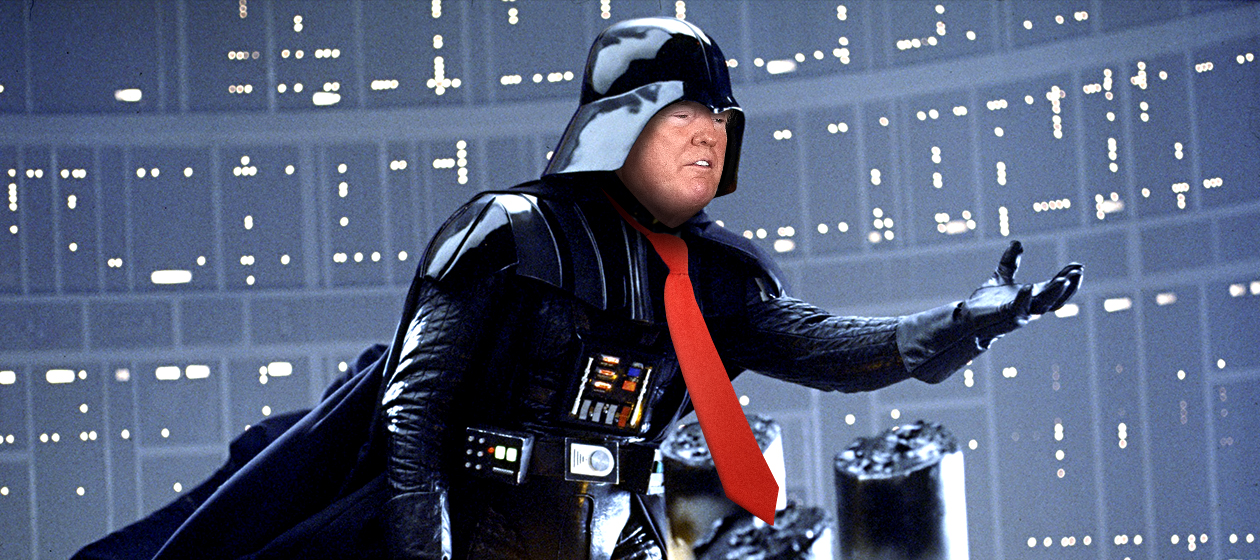Does America really need a Space Force?
Trump wants to militarize space. What would that even look like?


A free daily email with the biggest news stories of the day – and the best features from TheWeek.com
You are now subscribed
Your newsletter sign-up was successful
President Trump announced on Monday that he has directed the Department of Defense to begin plans to form a U.S. Space Force to stand as a sixth branch of the armed forces. "When it comes to defending America," he said at a meeting of the National Space Council, "it is not enough to have an American presence in space. We must have American dominance in space. So important."
The notion of a Space Force has long been bandied about in Washington. Last year, Rep. Mike Rogers of Alabama called for the formation of a space corps within the Air Force as a precursor to an independent service branch. (The Air Force, itself, was similarly established from the Army Air Corps.) The idea was shot down by Secretary of Defense James Mattis, who opposed the measure on the grounds that the military was trying to "reduce overhead," and that a new branch would do just the opposite. Someone, however, must have made Trump think all of this was his idea. And now it's policy.
"I am thrilled to have President Trump's continued support for this critical mission to help strengthen our national security," said Rogers, chair of the Strategic Forces subcommittee of the U.S. House Armed Services Committee, in a statement by email. "I look forward to working with the president to make this initiative a reality."
The Week
Escape your echo chamber. Get the facts behind the news, plus analysis from multiple perspectives.

Sign up for The Week's Free Newsletters
From our morning news briefing to a weekly Good News Newsletter, get the best of The Week delivered directly to your inbox.
From our morning news briefing to a weekly Good News Newsletter, get the best of The Week delivered directly to your inbox.
The idea goes further back than Rogers. In 2000, Donald Rumsfeld was chosen to be secretary of defense in part because of his work on, and endorsement of, space militarization. (This work was largely forgotten post-9/11.) In 1983, the General Accounting Office of Congress endorsed an Aerospace Force and the establishment of "a constellation of laser battle stations in space." Though previous proposals didn't go very far, this time it seems like it might actually happen. Republicans control the House and Senate, and Trump will sign anything they put in front of him.
He wants a Death Star, doesn't he?
A prospective Space Force will not likely involve squadrons of X-Wing starfighters scrambling to defend America from enemies alien, foreign, and domestic. (Though in the earliest days of spaceflight, the Air Force sought to establish something similar — minus laser cannons — with its single-seat X-20 spaceplane, and later, with the proposed Manned Orbiting Laboratory.) Rather, the idea is to defend American satellites, which are critical assets for civilians and the Defense Department alike.
As low-Earth orbit is developed by government and industry, there is no technical reason that a spacefaring nation cannot launch dormant satellite killers that remain in orbit until called upon to target and destroy opposing infrastructure. If you can launch a satellite-repairing spacecraft, you can launch a satellite-destroying spacecraft. Satellites aren't reinforced with hull plating. They are delicate and vulnerable by necessity; it is very expensive to launch anything heavy.
A free daily email with the biggest news stories of the day – and the best features from TheWeek.com
In a wartime situation, a Space Force would likely be called upon to cripple opposing satellites using a mix of such space-based assets and cyber attacks. Already, both the United States and China have proven they can destroy spacecraft when they so choose. In 2007, China blew up one of its weather satellites using an Earth-launched missile, to send a message to U.S. policymakers: Look what we could do if we wanted. In 2008, the U.S. launched a missile and destroyed a reconnaissance satellite of its own. The message to China: We can do that too.
The Outer Space Treaty forbids offensive operations in space, though doesn't necessarily conflict with a prospective Space Force. And though civilian-led, the ranks of NASA's astronaut corps have long been filled by service members. In the agency's earliest days, President Eisenhower instructed its leaders to constrain astronaut candidates to military test pilots as a way to deter lunatics from overwhelming the system. Agency demographics have changed since then, but even so, 26 of the 42 members of the astronaut corps are either active duty or retired service members. (There is also a former CIA officer in its ranks.)
How will he pay for it?
Should the Space Force become a reality, it remains to be seen how the U.S. will treat aggressive actions in Earth's orbit. If a hostile power launched a missile and blew up a cell phone tower on U.S. soil, it would be an act of war and invite massive retaliation. But if they destroyed a communications satellite, does the U.S. deploy the 82nd Airborne to respond? Will a Space Force have an intelligence function? Does it operate independently of NASA? Does it get its own moon base, or muscle its way into the base NASA plans to build? Will its relationship with NASA remain consistent with current practices, with the Space Force supplying astronaut candidates to the agency in the same way the service branches do today?
There are, of course, funding questions to be answered. Establishing a new branch of the armed forces isn't simply rearranging the office furniture and choosing new uniforms. Nor is it simply the cordoning of spacecraft experts under one roof. Only four percent of the U.S. Air Force are pilots. It takes another 300,000 airmen — from accountants to supply clerks — to support them. There is no reason to believe that the Space Force will be any different. Is that the best use of tax dollars? And if we are spending on space, is militarization really the best way to go? NASA's entire budget amounts to one-half of 1 percent of the federal budget. (Defense gets about 20 percent.) As the Planetary Society, a space advocacy group, points out, Americans spend more annually on chewable dog toys than they do on robotic space exploration, from Mars rovers to Pluto flybys. Imagine what NASA could do with Space Force-levels of funding.
A Space Force is not a new idea and it is not deranged, regardless of the mental state of the man now carrying its flag. But do we need it? And more importantly, do we even want it? Because once we make space a battlefield, we shouldn't be surprised when people decide to use it.
David W. Brown is coauthor of Deep State (John Wiley & Sons, 2013) and The Command (Wiley, 2012). He is a regular contributor to TheWeek.com, Vox, The Atlantic, and mental_floss. He can be found online here.
